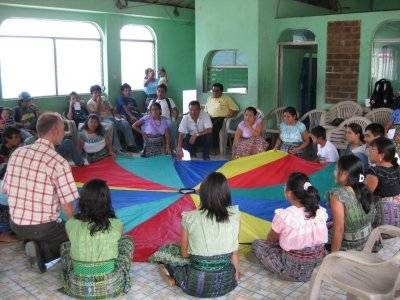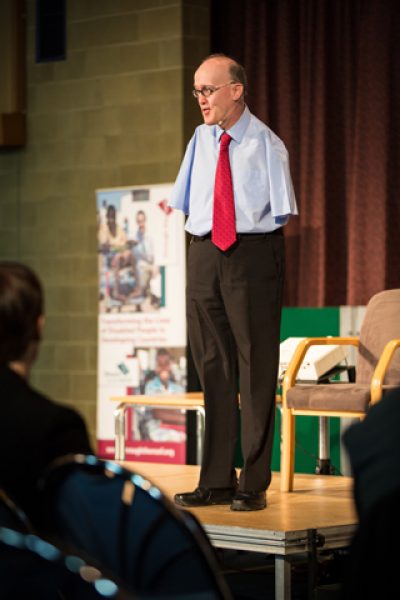All You Need is Love (Ros' Blog)

I love the way that Jesus approached people, as recorded in the Gospels. He didn’t overthrow convention just for the sake of it, but nor did He allow Himself to be bound by convention when love demanded a different way.
For example, when the synagogue leader came to plead with Him to heal his daughter, Jesus treated him with the respect due to someone in his position, stopped what He was doing and went with him. But when a woman touched His cloak in search of healing and tried to slink away unnoticed, He knew how important it was to affirm her, to show her that she mattered to Him, and to commend her faith. And so the synagogue leader was kept waiting; the deference due to his position was placed below the dignity of a mere woman, and a woman who was an outcast at that.
When Jesus was welcomed into the home of Lazarus and his two sisters at Bethany, He not only indicated that He didn’t consider a woman’s place to be in the kitchen, but He even encouraged the women to sit at His feet to listen and learn as equals with the men, something no other rabbi would ever have countenanced doing.
When the paralysed man was lowered through the roof down to where Jesus stood, the whole crowd waited expectantly for Jesus to pronounce words of healing, but at first he didn’t do so; He began by addressing him with a word which the New Testament writers translated into the Greek as “ἁνθρωπη” (“anthrope”) – a word denoting “human being”. In front of the whole crowd, Jesus affirmed the paralysed man’s full humanity. Next He spoke of forgiveness of sins, a prerogative that belonged to God alone, and only once that supremely important business was dealt with did He turn His attention to the physical cure the man was seeking.
When His disciples were criticised for picking and eating grain on the Sabbath, He pointed out that the Sabbath was supposed to be something people benefited from, not the other way round. When His disciples came and told Him the Pharisees had been offended by something He said, He dismissed them as blind guides trying to lead others, and falling into a ditch. When, in the middle of His sermon, someone shouted out, asking Him to settle a dispute, He didn’t tell them to either sit down and shut up or leave. Instead, He used the interruption as an opportunity to address the problem of materialism.
It wasn’t that He had no time for tradition, position or custom, but simply that these things always had to give place to whatever His Father wanted Him to do, which was always to love in some practical, life-transforming way.
As churches we can perhaps be too wedded to our conventions to see when God is doing something different. I heard a while ago about a young autistic man who called out three times in church, “Jesus is Lord!” and after the third time, his family were asked to remove him. That kind of exuberant shouting in the middle of the worship or the sermon didn’t fit with that particular church’s convention of how Sunday service should be conducted. As a result, a family felt sidelined and rejected. I can’t imagine anyone going away from an encounter with Jesus feeling like that.
By contrast, on a recent Sunday morning my church was meeting in an unfamiliar building, with not the usual person leading the meeting, and instead of starting with singing, we began with an activity focused on helping the children to think about how God speaks to them. For my autistic daughter, Ellen, this was a lot of change to process all in one go. Eventually she couldn’t contain herself any longer, and leaning forward in her wheelchair and pointing at the speaker, she shouted, “Excuse me, man! Excuse me, man!” As soon as he looked her way, she continued, “There will be worship songs!”
No one asked us to leave, no one tried to quiet Ellen, or tutted at me for not keeping her under better control. Instead, the speaker said, “We’ll see, let’s finish this activity first and then we can talk about that.” And once the activity was over, and we started to move into something else, another member of the congregation stood up and said, “I want to respond to what Ellen said to us at the beginning, and while we’re doing this, I’m going to go and sit at the piano and play some worship songs.” And he did so, with the result that the morning’s activity, which for once didn’t involve singing, was able to proceed as planned, but Ellen’s need to hear some worship music was also met.
In my last blog post I put out a plea for us to learn from the Master Himself how to approach our disabled brothers and sisters. And here, I believe is another way we can learn from Him. Conventions can be important. They can ensure that events run smoothly, that people are respected, that order is maintained. But they should never override the supreme command which Jesus left us, to love one another. We’re not called to go round rubbishing people’s traditions or ways of doing things, but whenever there’s a conflict between doing things the way we’ve always done them or making room to give love to someone, especially to a disabled person whose needs may differ from other people’s, love should always triumph, just as it did in the ministry of Jesus.
Golf Fundraising Day

Following our last successful Golf Day in 2014, we’ll be holding another fundraising day of fairway fun on Friday 22nd July 2016. Come along, support the work of TTR, and enjoy the day’s activities, including an 18-Hole Stableford Competition, Blindfolded Putting Competition, and Wheelchair-seated Longest Drive.
The whole day begins with registration at 8am, and costs £65 a head, including coffee and bacon roll on arrival and a two course lunch.
It's at Tyrrells Wood Golf Club, The Drive, Leatherhead, Surrey, KT22 8QP. To find out more, and book your place, please follow this link to email Margaret Bale.
A Master-Class in Disability Inclusion (Ros' Blog)

“We had a problem at church on Sunday,” someone told me as we chatted at the Big Church Day Out, “a disabled lady in our church was disgruntled because she felt people were ignoring her. But the thing is, we don’t always want to be swamping her with offers of help. It’s difficult to get it right.”
I tried to make some suggestions as to how to strike the right balance, but I couldn’t help reflecting on her words after the event was over. On an earlier occasion, a lady had told me, “At church everyone just assumes that any time I ask for help or for prayer it must be something to do with my disability. But one time I just wanted prayer because my mum had died, and no one gave me the opportunity to say so.”
So how do churches “get it right” for their disabled members? How do they give them enough assistance to participate fully, but not so much assistance that they feel singled out as Exhibit A? How do they give them an opportunity to say what is really on their mind, and not just assume that it must be disability-related? How do they enable disabled people to exercise their gifts fully for the blessing of the church?
In this, as in any area of church life, Jesus is the supreme role-model. In Mark 10. 46 – 52 we read,
As he was leaving Jericho with his disciples and a great crowd, Bartimaeus, a blind beggar, the son of Timaeus, was sitting by the roadside. And when he heard that it was Jesus of Nazareth, he began to cry out and say, “Jesus, Son of David, have mercy on me!” And many rebuked him, telling him to be silent. But he cried out all the more, “Son of David, have mercy on me!” And Jesus stopped and said, “Call him.” And they called the blind man, saying to him, “Take heart. Get up; he is calling you.” And throwing off his cloak, he sprang up and came to Jesus. And Jesus said to him, “What do you want me to do for you?” And the blind man said to him, “Rabbi, let me recover my sight.” And Jesus said to him, “Go your way; your faith has made you well.” And immediately he recovered his sight and followed him on the way.
There are several things I notice in this story. Firstly, a blind beggar sitting by the roadside must have been quite noticeable, especially to Jesus whose mandate, according to Luke 4, was “to proclaim liberty to the captives and recovering of sight to the blind.” Yet Jesus didn’t make a beeline for him, or draw attention to him in any way. However, as soon as Bartimaeus learned that it was Jesus passing by, he immediately wanted to attract His attention, and began calling out to Him. And without hesitation, Jesus responded to his call. We could learn much from this in churches – to treat disabled people just as we treat every other member, without drawing attention to any difference, yet ready at any moment to respond to a request from them.
Jesus did not respond by going to him, helping him to his feet and drawing very public attention to his disability. Instead, He allowed him the dignity of making his own way over, just as any other person would have done. It would not have been necessary to give him that level of assistance since, as the story makes clear, he was capable of leaping to his feet, throwing off his cloak and making his own way to where he heard Jesus speaking. We would do well to follow Jesus’ example of respecting people’s independence.
Once he was within speaking distance, Jesus asked him, “What do you want me to do for you?” Jesus’ mission was to heal, and yet He made no assumptions about what Bartimaeus wanted from Him. Perhaps Bartimaeus might have perceived his own greatest need as loneliness, or financial hardship. Jesus gave him the opportunity to articulate what he himself saw as his most pressing need. Only when Bartimaeus replied, “Rabbi, let me recover my sight” did He heal him of his blindness.
And finally, Jesus continued to respect his autonomy after the healing. He didn’t direct him where to go, or tell him, “Now you have an amazing testimony, and it’s your duty to go around witnessing to what God has done.” Instead, he left Bartimaeus to decide where to go and what to do. Understandably, Bartimaeus’ decision was to follow Jesus. Why wouldn’t he stay as close as possible to the one who had respected his dignity and given him the gift of healing?
In our churches, we can learn so much from this. We should be ready and available to help our disabled members, and we should create an atmosphere in which they feel able to reach out to us for whatever they need. It’s not wrong to ask if help is needed, but it’s good first to give people the chance to decide whether to reach out for assistance. We should give help where needed and respect independence where help is unnecessary. We should not assume we know what the person needs, but give them the opportunity to express what it is they are looking for, and we should not assume what gifts they have and how they want to exercise them, but should give them the space and freedom to become all God wants them to be and to follow Jesus wherever He leads.

